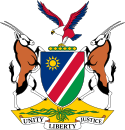The Labour Party is a social democratic political party in the Netherlands.
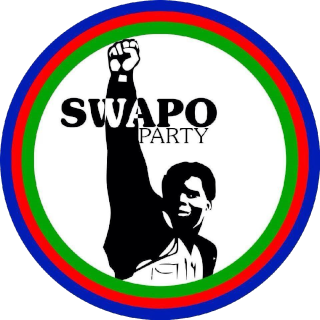
The South West Africa People's Organisation, officially known as the SWAPO Party of Namibia, is a political party and former independence movement in Namibia. Founded in 1960, it has been the governing party in Namibia since the country achieved independence in 1990. The party continues to be dominated in number and influence by the Ovambo ethnic group.
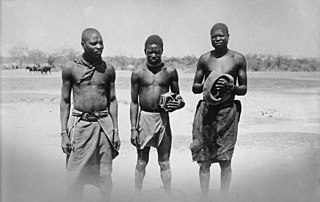
The Ovambo people, also called Aawambo, Ambo, Aawambo, or Ovawambo (Kwanyama), are a Bantu ethnic group native to Southern Africa, primarily modern Namibia. They are the single largest ethnic group in Namibia, accounting for about half of the population. Despite concerted efforts from Christian missionaries to wipe out what were believed to be 'pagan practices', they have retained many aspects of their cultural practices. They are also found in the southern Angolan province of Cunene, where they are more commonly referred to as "Ambo". The Ovambo consist of a number of kindred Bantu ethnic tribes who inhabit what was formerly called Ovamboland. In Angola, they are a minority, accounting for about two percent of the total Angolan population.

Elections in Namibia determine who holds public political offices in the country. Namibia is a semi-presidential representative democratic republic. It runs direct elections every five years for the position of the president and seats in the National Assembly, and every six years for the Regional Councils and the distribution of seats in local authorities. The National Council is elected indirectly by the constituency councillors of Namibia's 14 regions.

The Popular Democratic Movement (PDM) is an amalgamation of political parties in Namibia, registered as one singular party for representation purposes. In coalition with the United Democratic Front, it formed the official opposition in Parliament until the parliamentary elections in 2009. The party currently holds 5 seats in the Namibian National Assembly and one seat in the Namibian National Council and has lost its status as the official opposition party, taking the fourth place. McHenry Venaani is the President of the PDM.
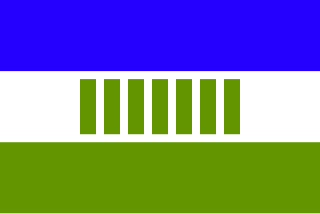
Ovamboland, also referred to as Owamboland, was a Bantustan and later a non-geographic ethnic-based second-tier authority, the Representative Authority of the Ovambos, in South West Africa.
Ovamboland, or Ovambo, was a Bantustan or "homeland" and later a second-tier authority in South West Africa for the Ovambo people during the apartheid period.

The National Democratic Party (NDP) is a political party in Namibia. It was formed in 1973 as the Ovamboland Independence Party (OIP) by Silas Ipumbu. It took the name NDP to contest the elections to the Ovambo Legislative Assembly, by then under the leadership of Cornelius Tuhafeni Ndjoba. The party's base was amongst the Ovambo people. The party is currently under the leadership of Mr. Martin Lukato Lukato. NDP won one seat in the National Assembly, sending Lukato to parliament, in the National Assembly election of 2024.
The Nigerian National Democratic Party (NNDP) was the first political party in Nigeria. The party was active in Lagos and was supported by the Lagos Daily Newspaper.
Peter Tanyangenge Kalangula was a Namibian political and religious leader. Bishop Kalangula had an interesting personal history that involved both politics and church.

The South West Africa National Union (SWANU) is a Namibian political party founded in 1959. Most of its members came from the Herero people, while fellow independence movement SWAPO was mostly an Ovambo party.

The Ovambo language is a dialect cluster spoken by the Ovambo people in southern Angola and northern Namibia, of which the written standards are Kwanyama and Ndonga.
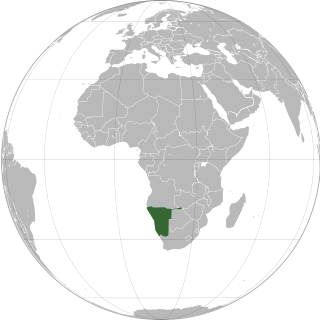
Lesbian, gay, bisexual, transgender, and queer (LGBTQ) rights in Namibia have expanded in the 21st century, although LGBTQ people still have limited legal protections. Namibia's colonial-era laws criminalising male homosexuality were historically unenforced, and were overturned by the country's High Court in 2024.
Clemens Kapuuo was a Namibian school teacher, shopkeeper, president of the Democratic Turnhalle Alliance (DTA), now called Popular Democratic Movement (PDM), and chief of the Herero people of Namibia. Kapuuo was one of the leading opponents of South African rule of his country until his assassination following the Turnhalle Constitutional Conference.

The Turnhalle Constitutional Conference was a conference held in Windhoek between 1975 and 1977, tasked with the development of a constitution for a self-governed South West Africa (Namibia) under South African control. Sponsored by the South African government, the Turnhalle Conference laid the framework for the government of South West Africa from 1977 to independence in 1989.

General elections were held in Namibia on 28 November 2014, although early voting took place in foreign polling stations and for seagoing personnel on 14 November. The elections were the first on the African continent to use electronic voting.

The Finnish Evangelical Lutheran Mission is a Lutheran missionary society formed on January 19, 1859, in Helsinki, Finland. It is one of seven organisations of the Evangelical Lutheran Church of Finland (ELCF) that conduct missionary work. Its first deployments outside Finland were made to Ovamboland, an area that today is cut by the Angola-Namibian border.
Mburumba Kerina was a Namibian politician and academic. He was a co-founder of SWAPO, NUDO, and FCN, and the founder of a host of smaller political parties. For independent Namibia, he was a member of Namibia's Constituent Assembly, as well as the National Assembly and the National Council. Kerina coined the name "Namib" for the independent state "Namibia" on the territory of South West Africa.
The College Democrats of America (CDA) is the official college outreach arm of the Democratic National Committee. It claims over 100,000 college and university student members in College Democrats chapters across the United States.
